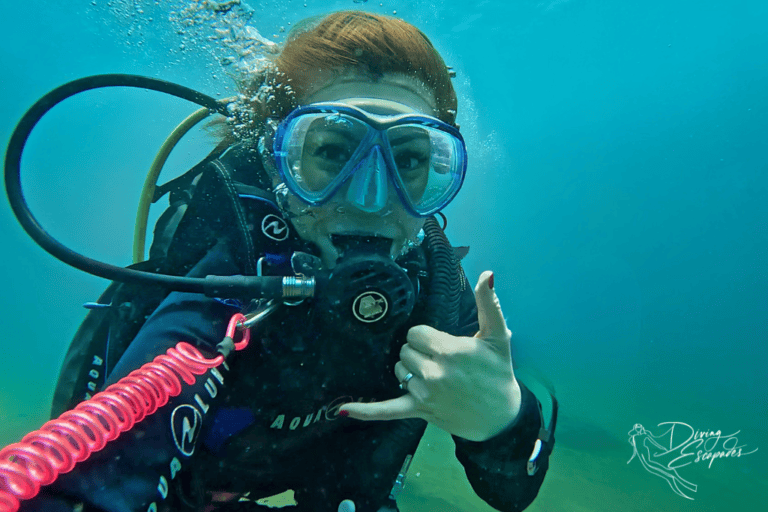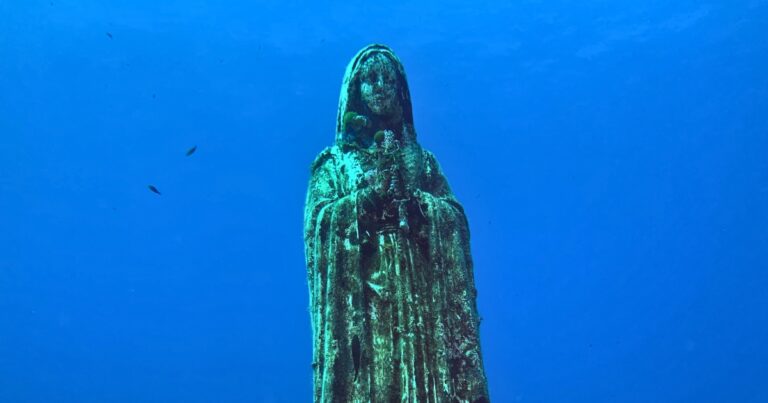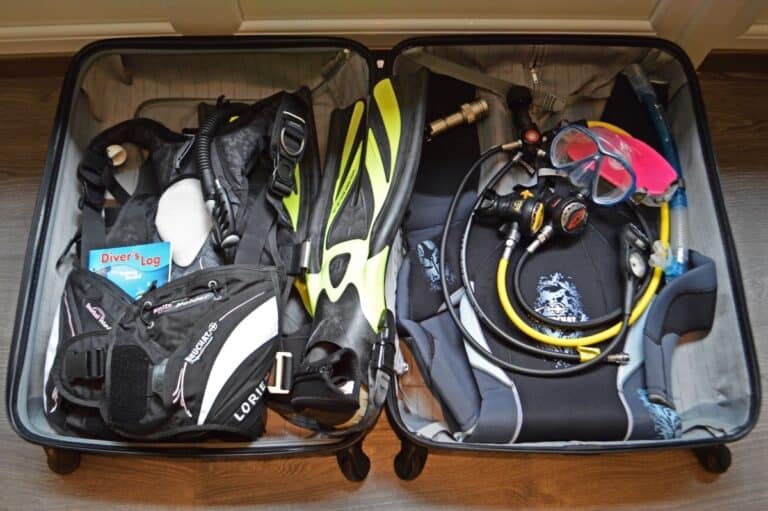11 Essential Scuba Diving Principles: Important Things to Remember When Diving
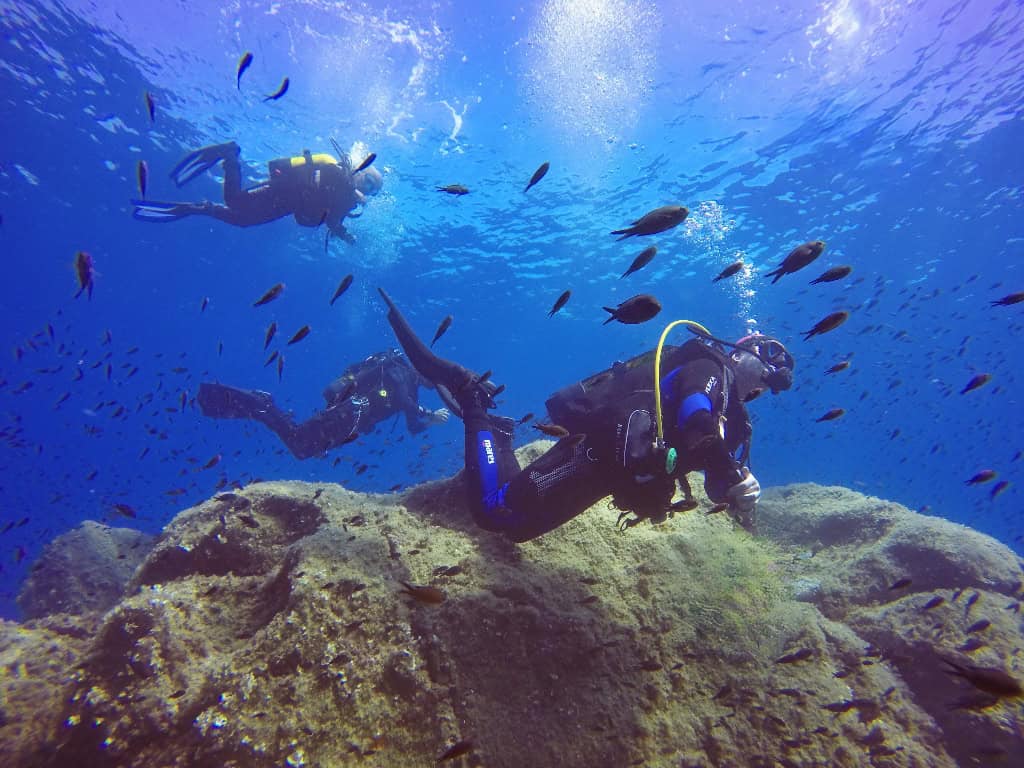

Scuba diving lets you dive into a whole new world (literally!) and explore the ocean’s incredible wonders, but knowing the right scuba diving principles is what makes each dive safe, memorable, and—honestly—way more fun. Imagine floating weightless among colourful corals and curious fish—now imagine doing that with confidence because you know you’re prepared.
After over 10 years of diving, I can say that the key to an amazing dive is a mix of prep, respect for the ocean, and knowing your limits (plus a solid sense of humor when the fish start staring back).
But let’s be real: diving is not just about ticking boxes on a checklist. It’s about staying safe and making sure we don’t disrupt the incredible underwater scene we’re there to enjoy.
A few essential principles—like good buoyancy and thorough gear checks—can make all the difference. These practices don’t just keep you safe – they protect our marine friends and their homes too.
So, based on my years in the water, here are eleven scuba diving principles that every diver, especially those new to the sport, should keep in mind. These tips will help you make the most of each dive, ensuring it’s safe, enjoyable, and filled with moments you’ll never forget.
1. Safety First
Safety should always be your top priority. I once had an experience where I signaled being out of air—thankfully, my buddy was quick to share air and help open my tank fully.
That situation taught me that safety is not just about protocols, it’s about being prepared for the unexpected.
Always stay in control of your buoyancy, regularly monitor your air supply, and dive within your training limits. Trust me, no dive is worth risking your safety.
PRO TIP: Always double-check your air supply and equipment before you hit the water. A quick once-over could save you from surprises down there.
2. Know Your Limits: A Key Scuba Diving Principle
Every diver has unique physical and psychological limits. Recognizing and respecting these limits are key to ensuring your safety underwater. This was also one of the key pieces of advice from Fabiana Loureiro, a scuba diving instructor in Luxembourg. Read the interview here.
Always dive within the scope of your certification and training, and be realistic about your fitness level and diving skills.
Pushing yourself beyond your comfort zone can increase the risk of panic, injury, or worse. By knowing your limits, you protect not only yourself but also your fellow divers.

Gear Recommendation: For reliable dive monitoring, a good dive computer is a must-have on every dive. This dive computer is one I personally recommend for new divers for keeping track of depth, time, and air supply. Knowing you’re within safe limits brings priceless peace of mind underwater.
3. Buddy System
Diving with a buddy is a fundamental safety principle and practice in scuba diving.
Your buddy can provide immediate assistance in case of equipment malfunction or other emergencies.
Throughout each dive, maintain visual contact and communicate effectively through established hand signals.
This partnership is not merely a safety measure but also enhances the joy and communal experience of diving.
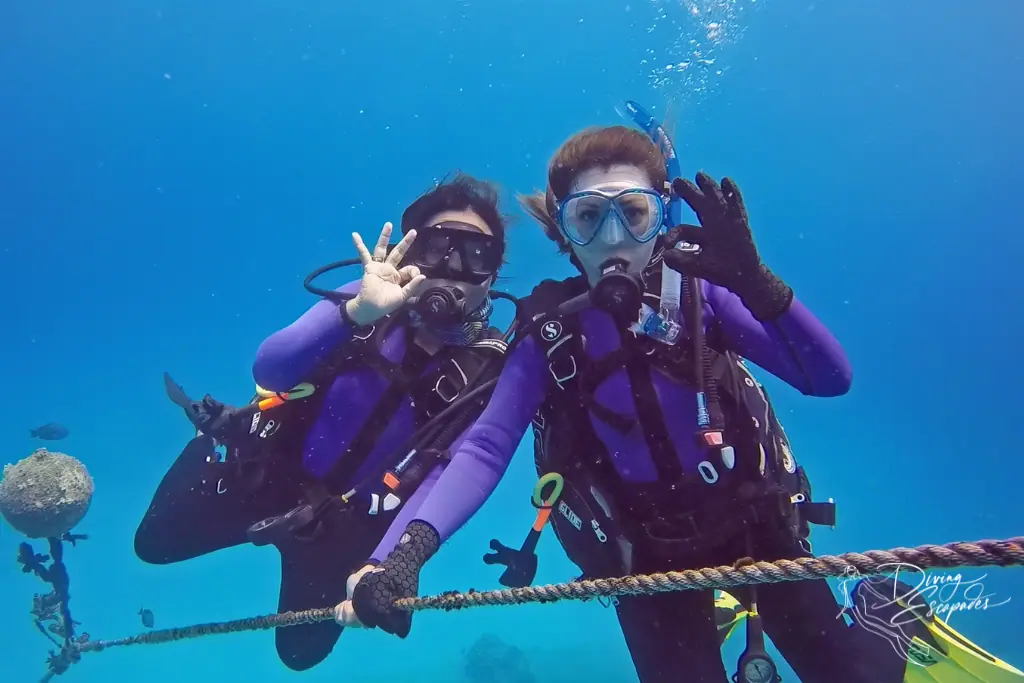
4. Check Your Equipment
One thing I’ve learned? Never rush your pre-dive checks. Even the smallest malfunction can escalate underwater.
I always double-check my tank valve, regulator, BCD inflator, and gauges. If something doesn’t feel right, don’t hesitate to ask for help.
You’ll thank yourself later when you’re 20 meters deep and enjoying the dive instead of worrying about your gear.
5. Plan Your Dive, Dive Your Plan: A Scuba Diving Principle You Shouldn’t Skip
Dive planning might sound tedious, but it’s crucial.
Before every dive, I assess the site conditions, calculate my air consumption rate, and ensure I have an emergency plan in place.
When I plan thoroughly, it not only makes me feel more secure, but it also frees me up to fully enjoy the dive, knowing I’m prepared.
PRO TIP: Even if you’re diving with a group, make sure you know the dive plan and conditions for yourself. It’s not just about following along – it’s about diving confidently and staying safe.
6. Monitor Your Air Supply
Keeping an eye on your air supply throughout the dive is crucial. Remember the principle “plan your dive and dive your plan”, which means ascending well before your air supply becomes critically low.
Stick to your dive plan and avoid the temptation to linger longer than you should. An emergency ascent due to low air can turn a beautiful dive into a stressful situation. It’s not just about having enough air for yourself but also being prepared to help your buddy if needed.
7. Stay Hydrated and Rested
Diving can be demanding, both physically and mentally. I make it a habit to hydrate and get enough rest before every dive.
Dehydration and fatigue can sneak up on you, increasing your risk of decompression sickness. A simple rule? No alcohol the night before diving, and plenty of water throughout the day.
PRO TIP: Hydration is often overlooked in diving, but it’s so important. A good stainless steel water bottle is great to bring along and keeps your water cool between dives. This one is compact and eco-friendly—two things every diver appreciates.
8. Respect Marine Life: A Fundamental Scuba Diving Principle
When I first started diving, I was eager to get close to marine creatures. But over time, I’ve learned that our presence can impact their behavior and habitat.
One of the most memorable moments I’ve had was observing a curious turtle in Apo Island—maintaining a respectful distance made the encounter even more special. As divers, it’s our responsibility to appreciate marine life without causing harm or stress.
Ultimately, our goal as divers should be to observe without interference, appreciate without affecting, and leave the underwater world as pristine as we found it.
For further insights into eco-conscious diving practices, refer to my previous post on “Eco Diving” or “Sustainable Diving” available here.
PRO TIP: Want an up-close experience with marine life? Stay calm, keep your movements slow, and let them approach you. Rushing up usually just scares them off.
9. Practice Buoyancy Control
Mastering buoyancy control is a game-changer.
Not only does it conserve air, but it also prevents accidental damage to the environment. I’ve seen divers unknowingly kick delicate corals because they hadn’t perfected their buoyancy.
Take the time to adjust your weights and practice finning techniques—it’ll make your dives more enjoyable and eco-friendly.
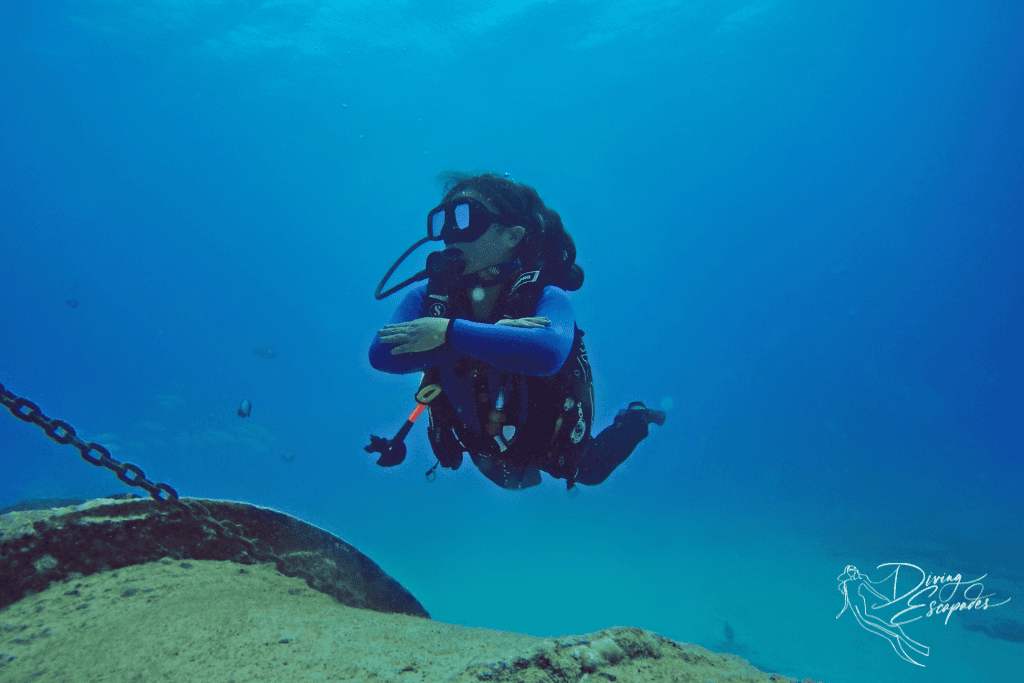
10. Leave No Trace
Adopting a “Leave No Trace” approach is critical when diving.
For information, the “Leave No Trace” principles actually originated in the 1960s in the United States as guidelines for minimizing environmental impact in natural areas, particularly popularized by outdoor organizations like the U.S. Forest Service and the National Outdoor Leadership School.
When applied to underwater environments, these principles emphasize responsible diving behaviors such as avoiding physical contact with reefs or seabed, and ensuring that divers do not disturb or remove marine life, helping to preserve the fragile aquatic ecosystems for future generations.
Therefore, be mindful of where you fin to prevent stirring up sediment, which can harm aquatic life. Each diver has a role to play in protecting the underwater environments we cherish.
11. Pick up trash when you see one: A Scuba Diving Principle for Cleaner Oceans
As scuba divers, we have the unique privilege of exploring underwater that are inaccessible to most. This privilege comes with a responsibility—especially when it comes to the plastic pollution we often encounter in these hidden places.
With about 8 million divers around the world, imagine the impact we could have if each of us removed just one piece of plastic every time we dived.
PRO TIP: Keep a small bag with you (like the TRSHBG) to pick up trash on your dives. Removing even a single piece of plastic makes a difference, and it’s super rewarding to leave the ocean cleaner than you found it.
Having said that, I encourage you to join me and countless others who are making a difference—one dive at a time. Visit the Diving Escapades’ Shop to check out TRSHBG, a specially designed bag that makes it easier for divers to collect and remove trash from our oceans.
Let’s turn our dives into cleanup missions and contribute to a healthier, cleaner ocean. Together, we can make a massive impact.
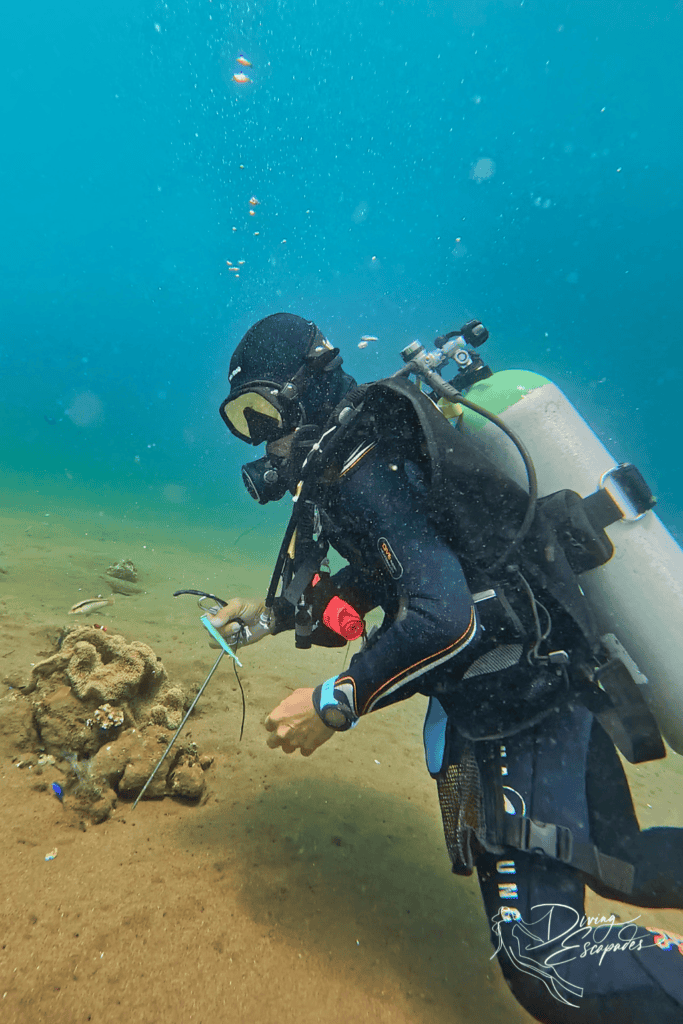
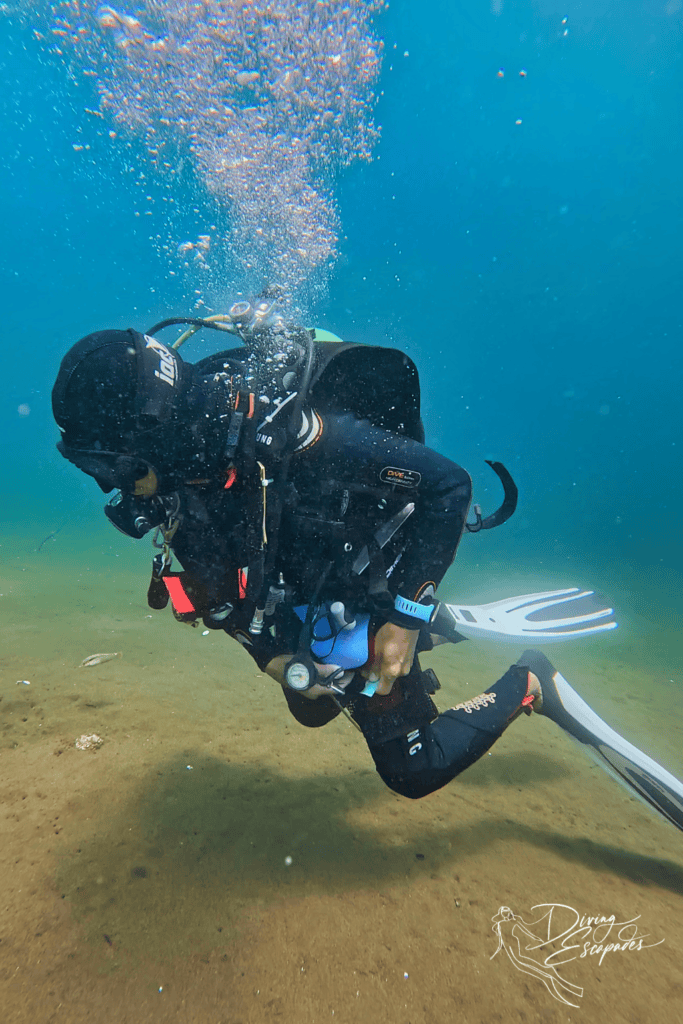
The Wrap Up
By putting these eleven scuba diving principles into action, you’re not just diving—you’re diving smart, safe, and with purpose. You’re not only boosting your own enjoyment and safety but also playing a part in the conservation of our beautiful, one-of-a-kind marine ecosystems.
And let’s be real, there’s something pretty cool about knowing your dives leave nothing but bubbles.
Every time you follow these principles, you’re helping to protect the delicate balance of underwater life, keeping our interactions sustainable and respectful. After all, these underwater locals are hosting us—we should be the best guests we can be!
Want to keep leveling up your dive game? Keep exploring, keep learning, and keep diving responsibly. My blog is packed with more tips, insights, and ways to make a positive splash in marine conservation. Join a growing community of divers dedicated to making a real difference for our oceans.
So, are you ready to dive deeper into ocean advocacy? Head over to my latest posts, and let’s turn every dive into a step toward a healthier, more vibrant ocean.


